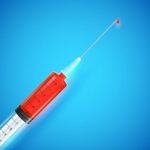Platelet Rich Plasma , or PRP has been received quite a bit of attention in the medical and public literature recently. This is one of the techniques we now have at our disposal to treat various tendon, ligament, muscle, and possibly arthritic disorders.
In prior years PRP was investigated for the treatment of tendon related disorders such as tennis elbow. PRP has received a lot more attention recently as an alternative to minimize or alleviate the pain associated with arthritis of the knee.
In a recent study published in the The American Journal of Sports Medicine it was shown that PRP or Platelet Rich Plasma for was effective for alleviating or improving the pain from arthritis of the knee. In this study, two different doses of PRP were given to patients and then compared to a saline injection (placebo). One group received a single injection of PRP, another group received two PRP injections, and the third group a single injection of saline or sterile salt water.
PRP is a component of whole blood. It is obtained by placing a sample of your blood in a centrifuge, spinning it for a few minutes and removing one of the layers that results. That layer is call platelet rich plasma.
Why all the attention? For too many years, decades really, orthopedists have thought in a rather mechanical manner. There was very little thought given to the biological response necessary for healing and instead we concentrated on the mechanical efforts (surgery) necessary. That is changing. We realize that the body possesses significant potential to heal itself in many circumstances. Especially, if the correct milieu of substances or chemicals can be placed in the injured area, and in the proper concentration. PRP contains a concentrated aliquot of those special cells and chemicals that can promote healing or enhance healing of certain injuries.

Today, the most common injuries treated with PRP are tendon, ligament and muscle injuries, as well as arthritis of the knee. Very recent data (2014) shows that PRP and stem cell might be able to regrow part of a removed meniscus after knee surgery.
Once we possess the PRP sample we inject it into the site of injury (an office based procedure) and then allow the chemicals and cells to work their magic, so to speak. The literature has shown that PRP can be useful in:
- Tennis elbow
- Golfers elbow
- Arthritis
- Certain ligament strains, eg. pitcher’s elbow
- Rotator cuff disease
- Medial Collateral Ligament tears of the knee
- Abdominal muscle injuries
and it can also be a useful adjunct at the time of surgery, and may prove to decrease the recovery time of certain procedures.
Here is a video discussing the basic science behind PRP …
Here are some articles regarding current concepts on the use of PRP:







